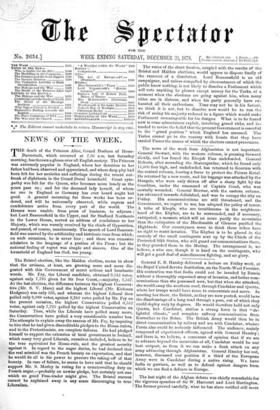The Bristol election, like the Maid= election, seems to show
that the artisans, at least, are growing more and more dis- gusted with this Government of secret actions and bombastic words. Mr. Fry, the Liberal candidate, obtained 9,342 votes, against only 7,795 given for Sir Ivor Guest,—majority, 1,547. At the last election, the difference between the highest Conserva- tive (Mr. S. V. Hare) and the highest Liberal (Mr. Kirkman Hodgson) was only 336, and whereas the highest Liberal then polled only 8,888 votes, against 9,342 votes polled by Mr. Fry on the present occasion, the highest Conservative polled 8,552 votes, against only 7,795 polled by the highest Conservative on Saturday. Thus, while the Liberals have polled many more, the Conservatives have polled a very considerable number less. The attempts to explain away the success of Mr. Fry, by imputing to him that he had given discreditable pledges to the Home-rulers, and to the Protectionists, are complete failures. He had pledged himself to support the extension of local government in Ireland, which many very good Liberals, ourselves included, believe to be the true equivalent for Home-rule, and the greatest security against it. In regard to the sugar duties, he had declared that the real mischief was the French bounty on exportation, and that he would do all in his power to procure the taking-off of that bounty. In case of failure, he seems to have said that he should support Mr. S. Morley in voting for a countervailing duty on French sugar,—probably an unwise pledge, but certainly not one which no good Free-trader might give. The Bristol success cannot be explained away in any sense discouraging to true Liberalism.
The votes of the short Session, coupled with the results of the Bristol and Maldon elections, would appear to dispose finally of the rumours of a dissolution. Lord Beaconsfield is an old campaigner, and unless compelled by circumstances of which the public know nothing, is not likely to dissolve a Parliament which will vote anything he pleases except money for the Turks, at a moment when the elections are going against him, when many cities are in distress, and when his party generally have ex- hausted all their enthusiasm. Time may not be in his favour, we think it is not, but to dissolve now would be to run the risk of seeing his majority reduced to a figure which would make Parliament unmanageable for his designs. What is to be feared now is some adventurous exploit, involving grand risks, and in- tended to revive the belief that the present Government is essential to the " grand position" which England has assumed. The Tories cannot go to the country with boasts that they have carried Passes the names of which the electors cannot pronounce.






































